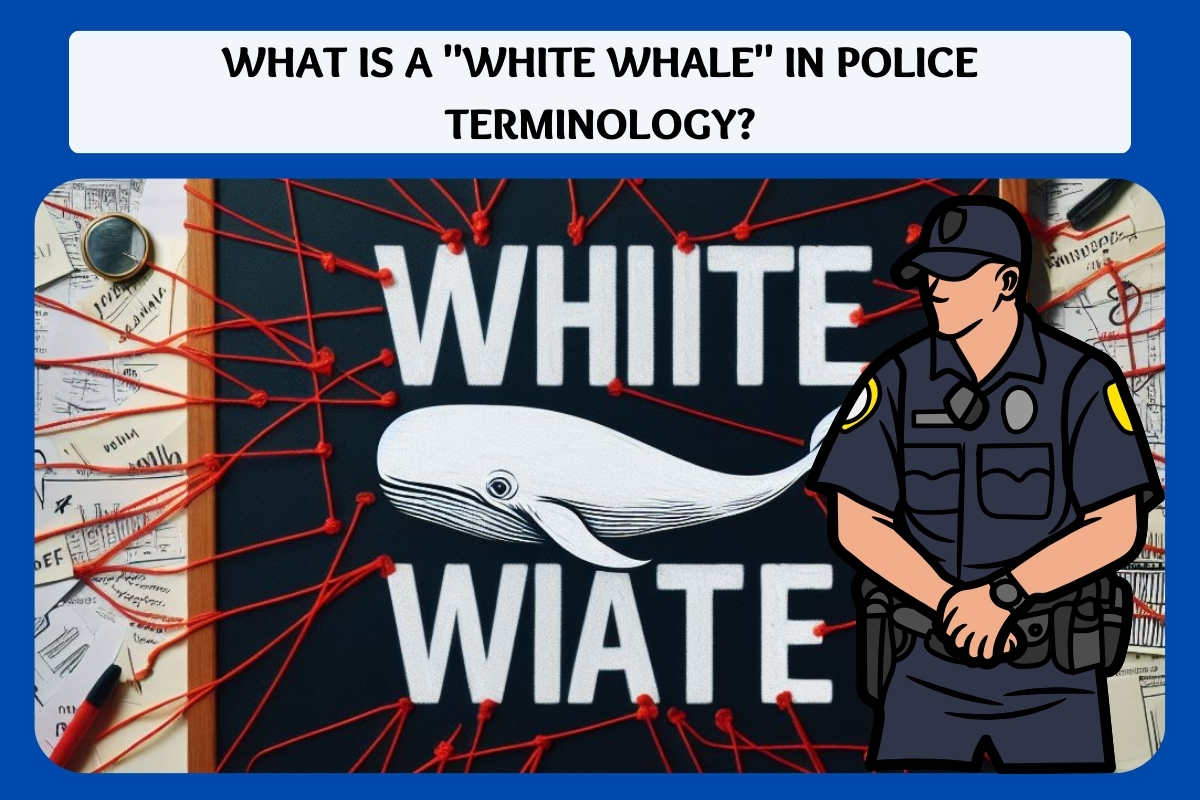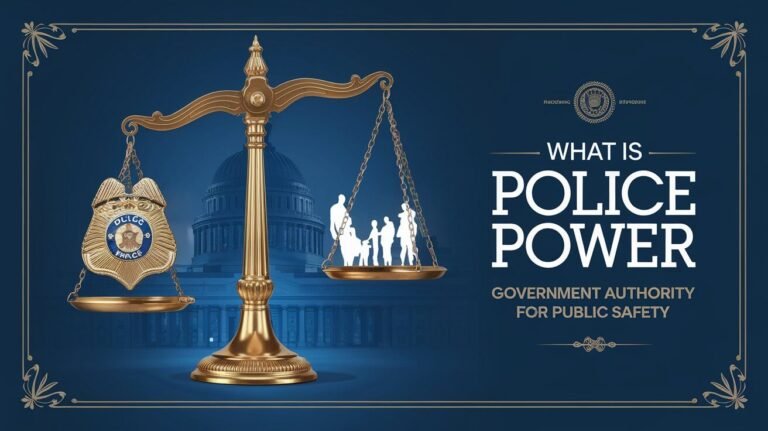What is a “White Whale” in Police Terminology?

In the world of law enforcement, the term “white whale” carries a significant and ominous meaning. It refers to a dangerous criminal who disregards their own safety and the safety of others, and whose pursuit is often seen as a futile chase. This metaphorical term draws inspiration from the classic novel “Moby Dick” by Herman Melville, where the white whale represents an obsessive and unattainable goal.
This guide examines the “white whale” metaphor’s roots, meanings when used by police, and proper use. It also covers related terms and notorious real cases illustrating this concept.
The Origins of “White Whale”
The term “white whale” finds its roots in the iconic novel “Moby Dick,” where the titular white whale symbolizes the all-consuming obsession of Captain Ahab, the novel’s protagonist. Ahab’s relentless pursuit of the massive white sperm whale, which had previously bitten off his leg, consumes him to the point of madness and ultimately leads to his demise.
This powerful metaphor has transcended the literary world, becoming a widely recognized symbol for an obsessive and seemingly unattainable goal or pursuit. In the context of law enforcement, it has taken on a specific meaning related to dangerous and elusive criminals.
What is a “White Whale” to Police Officers?
Within police slang, a “white whale” refers to a criminal who exhibits a blatant disregard for their own safety and the safety of others. These individuals are often viewed as reckless and unpredictable, making their pursuit inherently dangerous and potentially futile, much like Captain Ahab’s chase of the white whale.
Here’s a hypothetical example to illustrate the concept:
Imagine a seasoned police officer who has been tracking a notorious bank robber for years. This criminal has evaded capture time and time again, often resorting to violent tactics and putting the lives of officers and civilians at risk. Despite the mounting risks and slim chances of success, the officer becomes obsessed with apprehending this particular suspect, viewing them as their own personal “white whale.”
In such cases, the “white whale” represents a chase that is doomed to fail, as the criminal’s reckless behavior and disregard for safety make their eventual capture or demise almost inevitable, much like the white whale’s eventual clash with Captain Ahab.
The “White Whale” as an Unattainable Obsession
Beyond the immediate danger posed by a particular criminal, the term “white whale” also extends to encapsulate the broader concept of an obsessive and potentially unattainable pursuit. In this context, a “white whale” can represent any goal or objective that consumes an individual to the point of unhealthy fixation, often at the expense of their own well-being or professional responsibilities.
For example, an officer who becomes so consumed by the desire to solve a particular cold case or bring down a specific criminal organization that they neglect other aspects of their job or personal life could be said to be chasing their own “white whale.”
Other Meanings of “White Whale”
While the primary usage of “white whale” in police terminology revolves around dangerous and elusive criminals, the term has taken on additional meanings in other contexts:
- Money Laundering Operation: “White Whale” was also the name given to an international money laundering operation that ran from 2003 to 2005 in Spain. This particular usage highlights the term’s association with illicit activities and the pursuit of ill-gotten gains.
- General Metaphorical Meaning: Outside of law enforcement, “white whale” is commonly used as a metaphor for any obsessive pursuit or elusive goal that dominates one’s thoughts and actions, often to an unhealthy or self-destructive degree.
Why the “White” Metaphor?
The use of the word “white” in the term “white whale” has sparked various theories and interpretations. While some suggest it may have racial undertones, reflecting societal perceptions of unattainability or purity, others argue that the “white” aspect simply refers to the literal color of the whale in Melville’s novel.
Regardless of its specific origins, the “white” descriptor serves to enhance the metaphorical weight of the term, imbuing it with a sense of rarity, elusiveness, and perhaps even a touch of the supernatural or otherworldly.
When to Use “White Whale”
While the “white whale” metaphor can be a powerful and evocative way to describe certain criminal pursuits or obsessions within law enforcement, it’s important to use the term judiciously and appropriately.
In general, “white whale” should be reserved for situations involving truly dangerous and reckless individuals whose apprehension or pursuit could potentially endanger the lives of officers or civilians. Overusing the term or applying it to less serious cases could dilute its impact and significance.
Officers and agencies must remain professional and ethical when discussing or pursuing any case, whether the suspect is considered a “white whale” or not. Obsession or disregarding due process should never occur, even in challenging or high-profile cases.
Related Police Terminology
While “white whale” is a potent and widely recognized term within law enforcement circles, it’s far from the only piece of colorful slang used by officers. Here are a few other examples of police terminology that you may encounter:
- Peder-milk: A police officer who strictly follows the letter of the law, often to the point of being overly rigid or inflexible.
- Squeal: To inform on someone or provide incriminating information to the authorities.
- Perp Walk: The practice of parading an arrested suspect before the media.
- Bunco Squad: A specialized unit dedicated to investigating frauds and swindles.
Infamous “White Whale” Cases
Throughout the annals of law enforcement history, there have been several high-profile cases that have embodied the concept of the “white whale.” These cases often involve notorious criminals who have evaded capture for years, taunting authorities and garnering significant media attention.
One such example is the case of Ted Kaczynski, better known as the “Unabomber.” For nearly two decades, Kaczynski carried out a series of bombings across the United States, ultimately killing three people and injuring 23 others. Despite an extensive manhunt and investigation, Kaczynski remained at large for years, becoming a true “white whale” for the FBI and other law enforcement agencies.
Another infamous case that exemplifies the “white whale” metaphor is that of the Golden State Killer, also known as the East Area Rapist. This elusive serial killer and rapist terrorized California communities throughout the 1970s and 1980s, committing at least 13 murders and over 50 rapes. Despite numerous leads and investigations, the perpetrator managed to evade capture for decades, becoming an obsession for generations of detectives and investigators.
Though the perpetrators were eventually captured and convicted, these cases exemplify the relentless pursuit and obsession that can define chasing a law enforcement “white whale.”
In Short..
The term “white whale” in police terminology carries a significant and multifaceted meaning. It represents a dangerous and elusive criminal whose pursuit is often seen as futile, drawing inspiration from the classic novel “Moby Dick.” However, the term also extends beyond immediate physical danger, encapsulating the broader concept of an obsessive and potentially unattainable pursuit that can consume an individual to an unhealthy degree.
As we’ve explored, the “white whale” metaphor serves as a powerful and evocative way to describe certain criminal cases or obsessions within law enforcement, but it should be used judiciously and with an understanding of its deeper implications.
Ultimately, the concept of the “white whale” serves as a cautionary tale, reminding officers and agencies of the importance of maintaining perspective, professionalism, and ethical boundaries, even in the face of the most challenging and high-profile cases.






